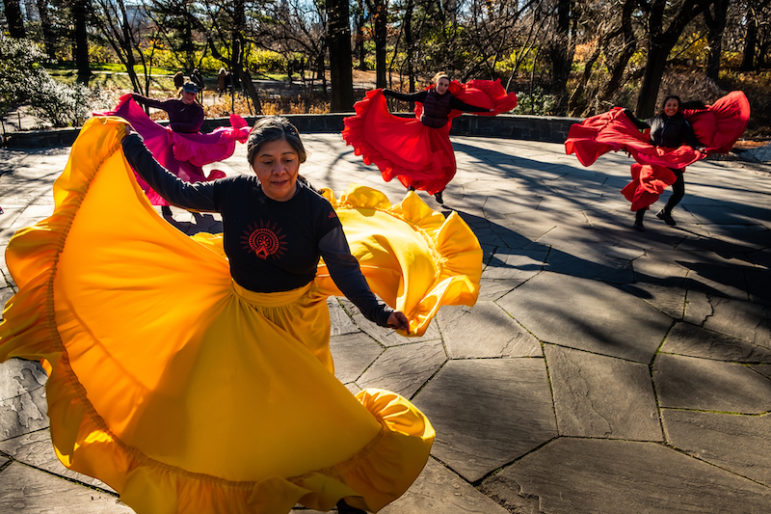“Creating a citywide cultural festival of global proportions would give locals and visitors a powerful new reason to explore the five boroughs each year, while sharpening the city’s creative edge amid an increasingly packed international calendar of must-do experiences.”

Adi Talwar
The Mazarte Dance Company practicing in Central Park in December 2020.New York is home to a rich diversity of annual arts and culture events, from Lunar New Year festivals and the West Indian Day Parade to the Tribeca Film Festival and the Armory Show art fair. But New York still doesn’t have a globally renowned citywide arts and culture festival on the scale of South by Southwest in Austin, the Venice Biennale, or the Edinburgh Fringe Festival—the latter of which generates as many as 3 million ticket sales annually and $630 million in economic impact in the small city of Edinburgh alone.
New York City deserves its own turn in the global spotlight. Now is the time for the Adams administration to launch the city’s first annual five-borough cultural festival—helping the city tackle several challenges at once.
Even viewed through the optimistic glow of spring, one key facet of the city’s economic and social fabric has struggled to regain its former strength: the city’s arts and culture sector. New York City is home to fewer actors, dancers, and musicians now than before the pandemic. Broadway attendance this season is 16 percent below where it was pre-COVID, several arts and nightlife venues have shut down, and numerous working artists have left for more affordable locations. Indeed, the broader arts and entertainment industry has only recovered 84 percent of its pre-pandemic jobs.
There’s a lot that city leaders should do to strengthen the city’s cultural sector, from boosting investment in affordable spaces for artists to live and work to fully funding the Department of Cultural Affairs. But the city also needs fresh ideas that can breathe new life into its arts ecosystem—and help create a more vibrant and resilient post-pandemic economy.
New York City’s first annual five-borough cultural festival can help achieve this, boosting international tourism and regional visitation, and giving New Yorkers an exciting new reason to celebrate.
One of New York City’s greatest competitive advantages in the hybrid work era is the magnetic pull of culture and the arts. This festival would build on these advantages by enlisting hundreds of venues across all five boroughs and open streets, parks, plazas, historic buildings, city-owned properties, and other spaces for music, dance, theater, visual art, cultural performances, and immersive experiences.
Creating a citywide cultural festival of global proportions would give locals and visitors a powerful new reason to explore the five boroughs each year, while sharpening the city’s creative edge amid an increasingly packed international calendar of must-do experiences. By attracting new audiences, facilitating collaboration, easing red tape, and directly supporting artists, this major new festival could also help nurture a full recovery for the arts and culture sector and demonstrate a new level of support going forward.
Inspired by citywide arts events around the globe, New York policymakers should work with cultural and community partners citywide to cultivate an annual cultural festival of unprecedented size, scale, and significance. The key first step is mayoral leadership to make this idea a priority, identify a target week in the annual calendar, and enlist a small group of cultural leaders and civic-minded entrepreneurs to help develop the festival’s operational structure, agenda, and logistics.
While much of the costs of programming the festival could be offset by corporate sponsorships, sales of individual tickets and week-long passes, as is the case in Edinburgh and Austin, the city can help in other ways. For instance, it can offer up city-owned buildings and public spaces for concerts, performances, installations, and parades—closing streets to traffic and allowing performances to take place in parks, plazas, and other public land. The city should also coordinate preparations for a festival of this scale with partners at the state level, with a focus on leveraging state capital grants to help support accessibility and facilities upgrades for cultural venues across all five boroughs.
New York still has work to do to keep pace with a vastly changed post-pandemic landscape. Creating an annual five-borough cultural festival would help bring the city together around the shared language of creative expression—and strengthen the city’s magnetism for people seeking experiences and connection.
Eli Dvorkin is the editorial and policy director of the Center for an Urban Future. Winston Fisher is a partner at Fisher Brothers and CEO of AREA15.









One thought on “Opinion: Why NYC Needs a Five-Borough Cultural Festival”
We have one! Open House New York! Do the writers of this not know about OHNY?